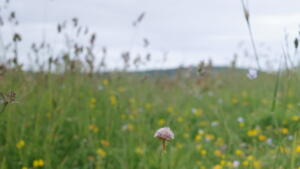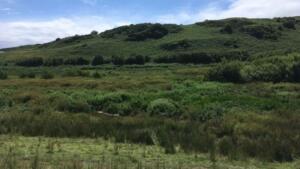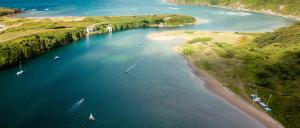
Grants
Landscape Regeneration
Life on the Edge
£10,000 awarded
Project Dates, Phase 1: 15.04.24 to 15.04.25
Life on the Edge aims to restore viable populations of some of the UK’s rarest invertebrates and plants living along the South Devon coast between Berry Head and Wembury, including the last known colony of the Six-banded Nomad Bee (Nomada sexfasciata).
A major cause of their decline is habitat loss and degradation, and a lack of habitat connectivity. Many of South Devon’s clifftop wildflower grasslands that provide nectar for bees and butterflies, and a home for oil beetles, have been lost to arable crops or grazing animals.
Life on the Edge is a five year project that will deliver targeted habitat restoration and creation at five key coastal biodiversity hotspots, covering a 75km stretch of coastline, to give threatened species a safer long-term future by expanding and reconnecting the traditional coastal landscapes on which they depend.
Landscape-scale change will be achieved by working to link these biodiversity hotspots – restoring high nature value coastal habitats, and connecting them with the South Devon B-lines network. This will support the recovery of threatened species, improve habitat connectivity, and boost the abundance and diversity of wildlife along the coast.
Practical habitat interventions coupled with landowner buy-in and conservation covenants will ensure the habitats are managed for the long term – providing a strong legacy for the project.
Life on the Edge is a collaborative project being delivered by Buglife, South Devon National Landscapes, National Trust, Torbay Coast and Countryside Trust, and local farmers, landowners, and communities. It is funded primarily by National Lottery Heritage Fund and Devon Environment Foundation.
Image credits: Below, Devon Environment Foundation. Title image of Six-banded nomad bee, Buglife.
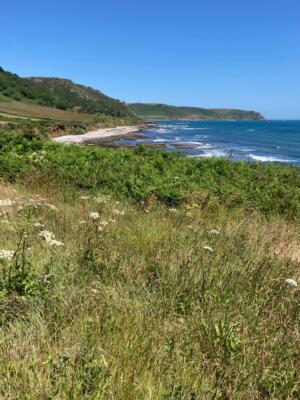
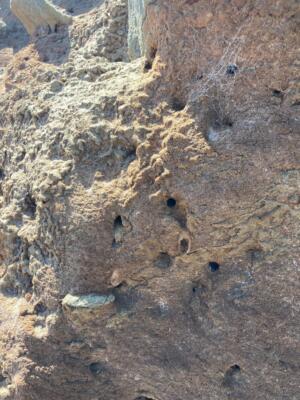

IMPACT SUMMARY MAY 2025
Project Activities:
- In year one, over 4,160 people were directly engaged through in-person activities.
- Partnerships have been built with specialist nature and conservation groups, individuals, the National Trust, Sparsholt College, and Exeter University.
- The ‘Learning with Life on the Edge’ programme has provided significant opportunities, including 3 Apprenticeships, 2 Trainees, and 1 Communications Assistant Intern.
- Television coverage featured BBC Spotlight covering the official launch and BBC Countryfile featuring the project’s Bee Banks.
- After Year 1, restoration work has begun on 32ha of habitat, and advice has been provided to landowners on approximately 78ha.
- Habitat creation, include:
• Trialing specialist ‘Bee banks’ (solitary bee nesting areas) at 3 locations, creating a total of 7 banks and clifflets.
• Breaking up over 11.5 hectares of scrub into islands, pockets, and sheltered glades to create space for wildflowers and more diverse habitats.
• Seeding or initiating arable reversion on 32 ha of species rich grasslands.
• Planting 750 wildlife hedgerow plants.
• Planting over 1,900 species rich meadow species plug plants.
Project Impacts:
- Through various practical activities, communications, and partnership working, the project is gaining momentum in raising awareness of core conservation messages and mobilising communities across the South Devon Coastline.
- Individuals and groups have shown keen interest in participating, expanding their knowledge of the local environment, target species, and the natural world more generally, and getting involved in practical conservation.
- Partnerships created through the project have expanded the project’s reach into specialist areas, aiding in gathering important data and creating a common goal among nature conservation and rural sector experts across the 100km project area
- One of the project’s main aims to make pollinator habitats bigger, better, and more joined up. Through the habitat restoration activities, the project is working towards this impact outcome.
